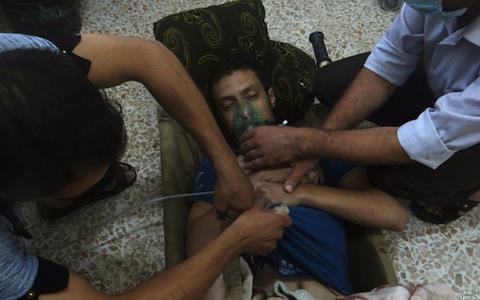The veteran reporter blames Ankara for a horrific Syria chemical weapons attack. That's unlikely--but he's right that Turkey is increasingly frustrated at Western foot-dragging on Assad.
ISTANBUL-- Analysts and diplomats in Turkey may doubt that Ankara orchestrated the deadly August poison gas attack near Damascus, as Seymour Hersh claims, but they insist that at least one important aspect of the Pulitzer Prize-winning reporter's new article is true.
In the latest issue of the London Review of Books, Hersh writes that Turkey organized the August 21 attack, which killed more than 1,000 people, to provoke a U.S. intervention in Syria. In interviews with The Daily Beast, observers dismissed that claim, but they concurred with Hersh's assertion that Turkey and its NATO allies are increasingly divided about how best to deal with neighboring Syria's civil war, which has left more than 150,000 people dead since it broke out three years ago. The conflict has sent more than 2 million refugees to neighboring countries, with Turkey hosting almost 900,000, according to the government in Ankara.
Semih Idiz, a respected foreign policy columnist with the independent Taraf newspaper, said that while Turkey and the West still agreed that President Bashar al-Assad had to go, there were two "serious rifts" between Ankara and its NATO partners. "One is about Turkey wanting its allies to bomb Syria after the chemical gas attacks and them refusing to do so," Idiz told The Daily Beast. "Then there is a rift over whom Turkey is supporting in Syria--I am talking about the jihadists."
Turkish officials have been calling for outside intervention in Syria for years and have voiced frustration with the deadlock in the U.N. Security Council, where Assad ally Russia has vetoed any resolution allowing the use of force. Although Ankara has the second-biggest armed forces in NATO after the United States, it is anxious to put a possible military strike in a U.N. or international context. The U.S., Germany, and the Netherlands have deployed Patriot anti-missile batteries in southern Turkey to defend it against possible attacks from Syria.
The West blamed the August poison gas attack on Assad's government forces and threatened military retaliation. That action was then called off by President Obama, who said he wanted to get congressional approval. Hersh writes that the real reason for the cancellation was the Obama administration's discovery of Turkey's involvement in the attack, which had been organized with the knowledge of Prime Minister Recep Tayyip Erdogan. Quoting an unnamed former U.S. intelligence official, Hersh writes that the U.S. intercepted conversations by Turkish officials that revealed "post-attack joy and back-slapping in numerous intercepts."
"We now know it was a covert action planned by Erdogan's people to push Obama over the red line," the former intelligence official said, according to Hersh.
Both Turkey and the United States governments have dismissed the story. In Ankara, Turkish government spokesman Bulent Arinc said the story was a "complete lie," while State Department spokeswoman Jen Psaki told reporters in Washington that the U.S. stood by its position "that these attacks last August 21st were done by the Syrian regime."
In Turkey, the role of MIT, the national intelligence service, in the Syrian crisis has been controversial for some time. Critics accuse the MIT of supplying Syrian rebels with weapons, which would run counter to the official Turkish position of helping the Syrian opposition politically but not militarily.
Police in Turkey have intercepted several suspected arms shipments from Turkey into Syria in recent months. In November, 1,200 Turkish-made mortar shells were discovered inside a Syria-bound truck. In May last year, Turkish media reported the seizure of two kilograms of sarin nerve gas components and the arrest of several suspects in the southern city of Adana. According to news reports, all the suspects were released from detention later in the year after they told a court in Adana that the chemicals had been ordered by the Free Syrian Army (FSA), the military arm of the opposition umbrella group Syrian Coalition, and they did not know what the substances were to be used for.
In January, public prosecutors in southern Turkey received a tip that a truck bound for Syria was carrying weapons but were prevented from searching the vehicle because it was being driven by MIT agents.
Last month, the Turkish air force shot down a Syrian fighter jet at the border between the two countries. A few days later, a recording of a wiretapped meeting in which MIT chief Hakan Fidan, Foreign Minister Ahmet Davutoglu, and other top officials discussed Syria appeared on YouTube. According to the recording, the officials talked about the possibility of provoking a military confrontation with Syria with a false-flag attack by agents sent to Syria to open fire onto Turkish territory.
The Turkish government said the recording was manipulated in parts and shut down access to YouTube. President Abdullah Gul said he himself had given the order to officials to discuss all the possible options in Syria.
The opposition Republican People's Party (CHP) in Ankara says the Erdogan government has already crossed the line of active military assistance for Syrian rebels. Mehmet Ali Ediboglu, a CHP member of parliament for the province of Hatay, which borders Syria, said last weekend that Turkish artillery at the border was firing into Syria to support rebel groups there. "Don't be surprised if war breaks out," Ediboglu told Turkish media.
A Western diplomat in Turkey said the government in Ankara was apparently frustrated with the lack of progress on resolving the crisis in Syria. "They are saying, 'Something has to be done,'" said the diplomat, who spoke to The Daily Beast on the condition of anonymity.


Spread the word